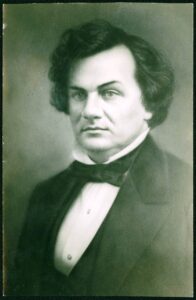The Kansas-Nebraska Act, signed into law over 160 years ago on May 30, 1854, by President Franklin Pierce, was closely related to national and sectional politics in the 1850s. The incentive for the organization of the territory, which would establish a territorial government, came from the need for a transcontinental railroad. Northerners wanted the road to follow a northern route. The Platte Valley, over which thousands of covered wagon emigrants had traveled to the far West, offered an excellent roadbed. No one was interested in building a railroad through unorganized Indian country. If the Platte Valley were to be used for the transcontinental railroad, the territory would have to be organized.
To help make the dream of the Platte Valley railroad come true, Senator Stephen A. Douglas of Illinois, an ardent supporter, repeatedly introduced bills in Congress providing for the organization of Nebraska Territory. In doing so, he ran afoul of southern ambitions to build the railroad west from some city of the South. No one believed there would ever be more than one transcontinental railroad.
Douglas also ran into a complication regarding the extension of slavery. By the terms of the Missouri Compromise of 1820, slavery was prohibited in the area where Nebraska would be formed. Southern politicians, cool about the organization of Nebraska for railroad purposes, were hostile to the admission of another free state into the union. This worsened the South’s already tenuous position in the sectional struggle for power.
In his enthusiasm for Nebraska, Douglas agreed to the creation of two territories instead of one. He also agreed to the doctrine of “popular sovereignty,” in which the citizens of each territory would decide for themselves whether they would tolerate slavery.
Many Northerners were highly critical of this concession to the institution of slavery. “Anti-Nebraska” meetings took place all over the North, particularly in the states of the Old Northwest. From these meetings the Republican Party developed. The controversy of the Kansas-Nebraska Act later played an important part in the beginning of the Civil War.





